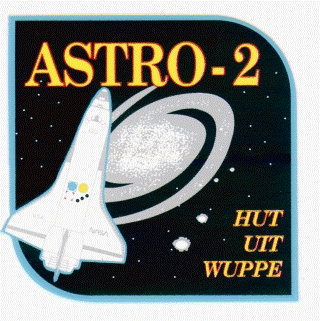I’ve been one of the more experimental astrophysicists in that I don’t just analyze data: I build the experiments to collect the data. In physics, building the instruments that you use in your experiments is a tradition, unlike in astronomy, where scientists tend to use devices that they did not build themselves. In astronomy, there are only a few types of data to collect and many scientists with questions that need the data for answers. Because the data types are fixed, new experiments do not always require a new instrument; a lot of scientists can use the same instrument, so there are fewer scientists that need to build the instruments.
Astro-2 Mission Patch: The Hopkins Ultraviolet Telescope (HUT), for which Warren Moos was a Co-Investigator, flew on the space shuttle (STS-67) in March 1995 for 16 days. There were more than 20 science programs for the mission, but the primary science goal was to detect and measure the characteristics of the primordial intergalactic medium. This is an example of the more extensive experimentation that can be done over 16 days in space versus 5 minutes.
Credit: NASA/STScI/Johns Hopkins University
With my technical background, it would have been easy for me to get into building my own rocket instruments and constructing space hardware for its own sake. However, the point is that as a scientist, you’re not just building an apparatus to build it; you’re building it to answer a question. As a scientist, you are always scratching your head and asking, “What does this mean? Can I find out if this is so?” Then, after you ask those questions, you ask, “How can I design an experiment that will answer these questions?” Only then do you start thinking about how to design the necessary instruments and space hardware required to do the experiment.
Experimental science is a different approach from engineering. It’s very close to engineering, but it’s different. Deciding between the two is a choice I think you first have to make when you go to college if you are interested in a science career, a big choice. And you make other choices, too, such as whether you have an interest in mathematics; you make that choice even in high school when you decide what kinds of mathematics you’re going to take. The choices you are making can close doors and open doors. If you don’t get algebra at some point in your career, you’re not going to go in a certain direction. If you don’t take trigonometry or if you don’t take geometry, those kinds of classes, you’re making a conscious choice about where you want to go and what you want to do. I’m not saying there’s a right choice, but you are making a choice. I don’t know that we always understand this when we are students.


